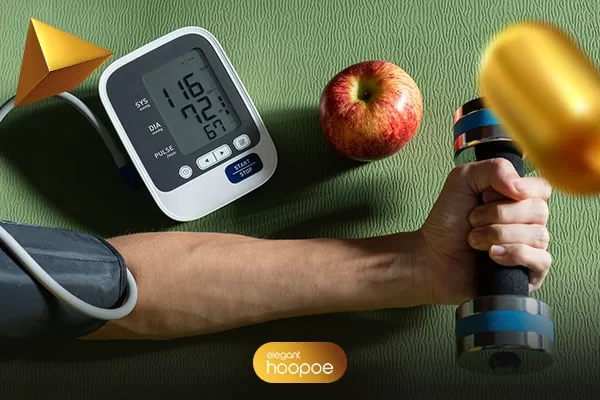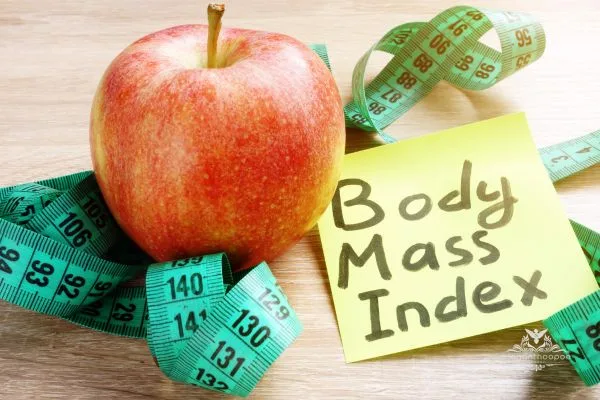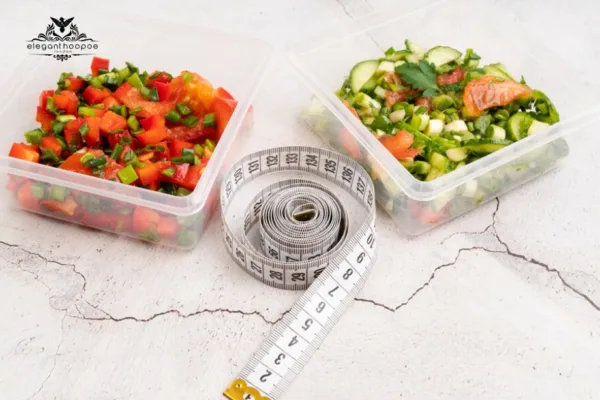Can Weight Loss Really Lower Blood Pressure?
Yes! Weight loss and blood pressure are closely linked, and shedding even 5-10% of body weight can significantly lower hypertension risk. Here’s how:
- Reduces strain on the heart, improving circulation
- Lowers inflammation, helping blood vessels function better
- Improves insulin sensitivity, reducing hypertension risks
- Boosts overall cardiovascular health
Pairing weight loss with a healthy diet, regular exercise, and stress management makes it even more effective. Managing weight isn’t just about appearance—it’s a powerful tool for better heart health!
Weight loss and blood pressure are two important health factors that are often interconnected. High blood pressure, also known as hypertension, is a common health condition that affects a significant proportion of the population worldwide. It is a major risk factor for heart disease, stroke, and other serious health problems. There are various factors that can contribute to the development of high blood pressure, including excess weight and obesity.
Weight loss has been shown to have a positive impact on blood pressure levels, and can be an effective strategy for managing hypertension. The relationship between weight and blood pressure is complex and multifactorial. Being overweight or obese can increase the workload on the heart and lead to higher blood pressure readings. Additionally, excess body fat can cause inflammation and impair the function of blood vessels, which can further contribute to high blood pressure.
However, losing weight through a combination of diet and exercise can help to improve blood pressure readings and reduce the risk of developing hypertension. Even a modest weight loss of 5-10% of one’s body weight can have a significant impact on blood pressure levels.
In this article on Elegant Hoopoe, we will explore the relationship between weight loss and blood pressure, weight loss benefits for managing hypertension, effective strategies for losing weight and managing blood pressure, and and how losing weight can be beneficial for individuals with hypertension.
The Link Between Weight Loss and Blood Pressure
The relationship between weight and blood pressure is complex and multifactorial. Being overweight or obese can increase the risk of developing high blood pressure, or hypertension, due to the increased workload on the heart and blood vessels.
Excess body weight can cause an increase in blood volume, which can lead to higher blood pressure readings. Additionally, the presence of excess body fat can cause inflammation and impair the function of blood vessels, leading to higher resistance and further increasing blood pressure.
Research has shown that there is a strong correlation between body mass index (BMI) and blood pressure. A higher BMI is associated with higher blood pressure levels, and losing weight can lead to significant reductions in blood pressure.
Furthermore, certain factors such as age, gender, and genetics can also influence the relationship between weight and blood pressure. For example, older adults and men are more likely to develop hypertension, while genetics may play a role in the development of high blood pressure even in individuals with a healthy weight.
Overall, maintaining a healthy weight through a combination of diet and exercise is an important strategy for managing blood pressure and reducing the risk of developing hypertension.
The Impact of Weight Loss on Blood Pressure
Weight loss can have a significant impact on blood pressure, particularly for individuals who are overweight or obese. Losing weight can help to reduce blood pressure readings and lower the risk of developing hypertension, as well as improve overall cardiovascular health.
Studies have shown that even a modest weight loss of 5-10% of one’s body weight can have a significant impact on blood pressure levels. This is because weight loss can reduce the workload on the heart and blood vessels, leading to lower blood pressure readings. Additionally, losing weight can improve the function of blood vessels, reduce inflammation, and improve insulin sensitivity, all of which can contribute to better blood pressure control.
Furthermore, weight loss can have a positive impact on other cardiovascular risk factors, such as cholesterol levels and blood sugar control. This can lead to an overall reduction in the risk of developing heart disease, stroke, and other serious health complications.
It’s important to note that weight loss alone may not be sufficient to manage high blood pressure, and lifestyle modifications such as dietary changes, regular exercise, and stress management techniques may also be necessary. However, weight loss can be an effective component of a comprehensive approach to blood pressure management.
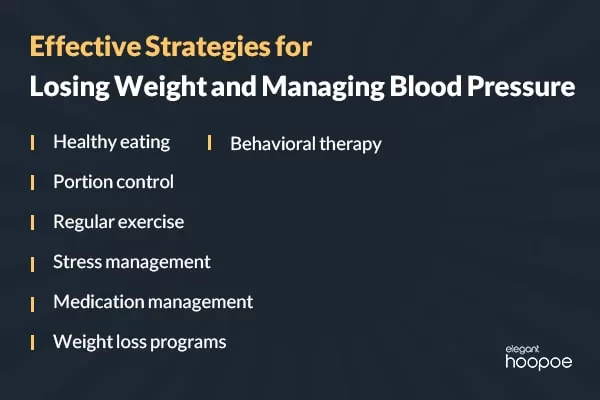
Effective Strategies for Losing Weight and Managing Blood Pressure
Losing weight and managing blood pressure can be challenging, but there are several effective strategies that can help:
- Healthy eating: Eating a balanced, nutritious diet that is rich in fruits, vegetables, whole grains, lean protein, and healthy fats can help to support weight loss and improve blood pressure readings.
- Portion control: Reducing portion sizes can help to reduce overall calorie intake and support weight loss.
- Regular exercise: Regular physical activity can help to support weight loss and lower blood pressure readings.
- Stress management: Chronic stress can contribute to high blood pressure, so finding effective stress management strategies, such as meditation, yoga, or deep breathing exercises, can be beneficial for managing blood pressure.
- Medication management: In some cases, medication may be necessary to manage high blood pressure. It’s important to take any prescribed medication as directed and to communicate regularly with a healthcare provider about any concerns or side effects.
- Weight loss programs: Joining a weight loss program, can provide support, accountability, and guidance for effective weight loss.
- Behavioral therapy: Behavioral therapy, such as cognitive-behavioral therapy (CBT), can help to identify and address any underlying psychological factors that may be contributing to overeating or unhealthy behaviors.
Diets for Lowering Blood Pressure
There are several diets that have been shown to be effective for lowering blood pressure, including:
- DASH diet: The DASH (Dietary Approaches to Stop Hypertension) eating plan is a well-researched diet that emphasizes whole grains, fruits, vegetables, low-fat dairy, lean proteins, and limited amounts of saturated and total fats. This diet has been shown to significantly reduce blood pressure readings.
- Mediterranean diet: The Mediterranean diet is a plant-based diet that emphasizes whole grains, fruits, vegetables, legumes, nuts, seeds, and olive oil, with moderate amounts of fish and limited amounts of red meat, dairy, and processed foods. This diet has been associated with lower blood pressure readings and improved cardiovascular health.
- Vegetarian or vegan diet: Vegetarian and vegan diets are plant-based diets that eliminate or limit animal products. These diets have been shown to lower blood pressure readings, potentially due to their high fiber content and low levels of saturated fat.
- Low-sodium diet: Reducing sodium intake has been shown to lower blood pressure readings, particularly in individuals who are salt-sensitive. A low-sodium diet typically limits sodium intake to less than 2,300 mg per day.
- Dietary Approaches to Stop Hypertension-Sodium (DASH-Sodium) diet: This variation of the DASH diet limits sodium intake to 1,500 mg per day and has been shown to significantly lower blood pressure readings.
It’s important to note that while these diets can be effective for lowering blood pressure, they may not be appropriate for everyone. Consulting with a healthcare provider or registered dietitian can help determine the best dietary approach for individual needs and health goals.
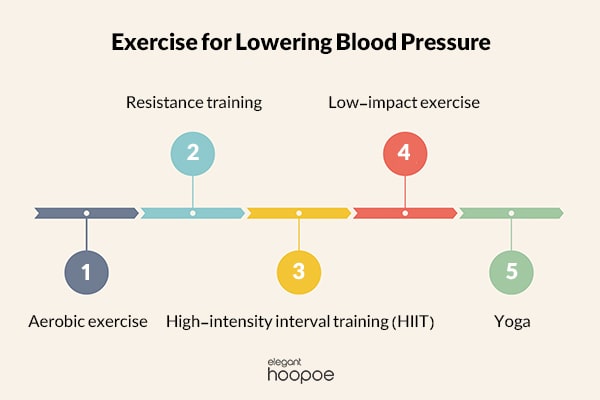
The Best Exercise for Lowering Blood Pressure
Exercise is an important component of a healthy lifestyle and can be effective for lowering blood pressure. Regular physical activity can help to reduce blood pressure readings and improve overall cardiovascular health. Here are some types of exercise that can be effective for lowering blood pressure:
- Aerobic exercise: Aerobic exercise, such as brisk walking, jogging, cycling, or swimming, can help to lower blood pressure readings. Aim for at least 150 minutes of moderate-intensity aerobic exercise per week, or 75 minutes of vigorous-intensity exercise per week.
- Resistance training: Resistance training, such as weightlifting or using resistance bands, can help to improve muscle strength and endurance, which can lead to lower blood pressure readings.
- Yoga: Yoga has been shown to have a beneficial effect on blood pressure readings, potentially due to its stress-reducing effects. Practicing yoga regularly can help to lower blood pressure readings and improve overall cardiovascular health.
Related article: How Does Yoga Help You Lose Weight
- High-intensity interval training (HIIT): HIIT involves alternating between short periods of high-intensity exercise and periods of rest or low-intensity exercise. This type of exercise can be effective for lowering blood pressure readings and improving overall cardiovascular health.
- Low-impact exercise: Low-impact exercises, such as walking, cycling, or swimming, can be a good option for individuals who have joint pain or mobility issues. These exercises can still be effective for lowering blood pressure readings and improving overall cardiovascular health.
It’s important to note that before beginning any exercise program, it’s important to consult with a healthcare provider to ensure that it is safe and appropriate for individual needs and health goals.
Timeline for Improvement in Blood Pressure after Losing Weight
Losing weight can have a positive effect on blood pressure readings, but the timeline for improvement can vary depending on individual factors, such as starting weight, weight loss goals, and overall health. Here is a general timeline for improvement in blood pressure after losing weight:
- Within a few weeks: Some individuals may begin to see a reduction in blood pressure readings within a few weeks of starting a weight loss program, particularly if they have a significant amount of weight to lose.
- Within a few months: For many individuals, significant improvements in blood pressure readings may occur within a few months of starting a weight loss program. This is particularly true for those who lose a moderate amount of weight, such as 5-10% of their starting weight.
- Long-term: Maintaining a healthy weight over the long-term can help to sustain improvements in blood pressure readings. Even modest weight loss that is maintained over time can have a positive effect on blood pressure readings and overall cardiovascular health.
It’s important to note that blood pressure readings should be monitored regularly by a healthcare provider. Additionally, lifestyle changes such as healthy eating habits and regular physical activity should be maintained over the long-term for optimal blood pressure management.

Working with Healthcare Professionals to Manage Blood Pressure through Weight Loss
Working with healthcare professionals is an important aspect of managing blood pressure through weight loss. Healthcare professionals such as doctors, registered dietitians, and exercise physiologists can provide guidance and support to individuals looking to lose weight and improve their blood pressure. Here are some ways healthcare professionals can help manage blood pressure through weight loss:
- Develop a personalized weight loss plan: A healthcare professional can help develop a personalized weight loss plan based on an individual’s starting weight, weight loss goals, and overall health. This plan may include recommendations for healthy eating habits, physical activity, and monitoring of blood pressure readings.
- Monitor blood pressure readings: Healthcare professionals can monitor blood pressure readings regularly to track progress and make adjustments to the weight loss plan if necessary. They can also provide education on how to properly monitor blood pressure at home.
- Provide education and support: Healthcare professionals can provide education and support on healthy eating habits, physical activity, and other lifestyle changes that can help manage blood pressure through weight loss. They can also offer resources and referrals to other healthcare professionals as needed.
- Collaborate with other healthcare professionals: Healthcare professionals may work together to provide comprehensive care for individuals managing blood pressure through weight loss. For example, a registered dietitian and exercise physiologist may collaborate with a doctor to develop a personalized weight loss plan that addresses both dietary and physical activity needs.
Overall, working with healthcare professionals can be an important part of successfully managing blood pressure through weight loss. It’s important to communicate openly and honestly with healthcare professionals and to follow their recommendations for healthy weight loss for blood pressure.
Concluding Remarks
Weight loss can be an effective strategy for managing blood pressure, particularly for individuals who are overweight or obese. Losing weight can reduce strain on the heart, improve blood vessel function, reduce inflammation, and lower insulin resistance, all of which can contribute to lower blood pressure readings.
However, it’s important to work with a healthcare professional to develop a safe and effective weight loss plan that addresses individual needs and goals. By combining healthy eating habits, regular physical activity, and ongoing monitoring of blood pressure readings, individuals can successfully manage their blood pressure through weight loss and improve overall cardiovascular health.


